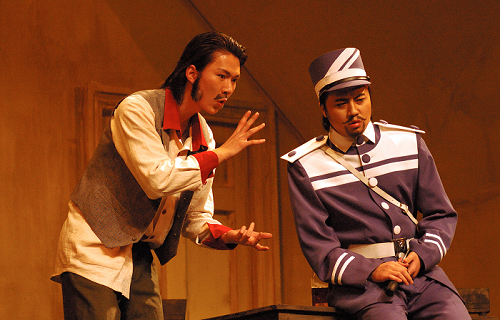
Director: Wang Xiaoying (Invited), Wang Liangbo
Playwright: Eduardo De Filippo (Italy)
Translator: Jin Zhiping
Institution: The Central Academy of Drama, China
Venue: Experimental Theatre Centre, the Central Academy of Drama
Time: 16:15-18:00, May 18, 2007
Event: ATEC 2nd International Forum
Director’s Notes
La Grande Magia was written in 1948 by Eduardo De Filippo, the renowned Italian comedy writer. That was a time when the"Theatre of Absurd" hadn't made its appearance on the European stage, but the plays in the style of "absurd"were already very popular, the well-known Friedrich Durrenmatt and Luigi Pirandello are typical examples in this regard.
La Grande Magia, as Eduardo himself said is a parable, but the technique of symbolism is indeed quite "absurd". Act One began with the scene that is very common in the western comedy plays: the husband got fooled in public while the wife eloped with her lover, drawing in the spectators and confusing them too. However, the confusion and bewilderment was not triggered by the story's plot, but by the thoughts of Calogero and his judgments of the reality. His mind was so disturbed under the manipulation of the magician Otto Marvuglia that he could not even judge himself. Like a boat floating in a thick fog on the boundless sea, Calogero got himself lost.
This was like a sophism-based mind game that seems a bit unpleasant, embarrassing not only the "actors", but also the spectators who are watching the play. Although La Grande Magia is nothing more than Otto Marvuglia's charlatanism, it compels one to face up to the challenge posed by his or her life -- no one knows for sure the full implications of the situations, circumstances and people in his or her life and it is more so when it comes to human emotions and relationship. Such sense of frustration in life consequently leads to the uncertainty in the facticity of his or her life. This experience can be both depressing and exciting, as sailing in the fog on the sea always needs courage, resolution and adventure spirit. In La Grande Magia, Calogero and Otto responded to the complex and confusing destiny through two opposite ways, though both exhibited the true and intricate feelings and emotions. It is noteworthy that two lead characters in this grand parable" represent two extreme attitudes, and each of us actually lies in between the two extremes...
Eduardo De Filippo was passionate about life as he himself said, so are we. Just because we all love life, doesn't mean it is impossible to use theatre to portray a sensitive soul who gets confused about life and humanity. It is probably the confusion and bewilderment one way or another that develops and strengthens our sense of consciousness, and in this sense the profoundness of theatre begins to unfold.
Synopsis
The story took place in Naples, a romantic and mysterious city in south of Italy. One moonlit evening, Calogero and his young beautiful wife Marta were watching a magic performance in the garden of the Hotel Metropol. Otto Marvuglia, a legendary conjurer invited Marta to step onto the stage being part of his performance. Then Marta stepped into a copy of an Egyptian sarcophagus and disappeared from view since then. As vexed Calogero kept asking the magician to bring his wife back, Marvuglia handed him a small box which supposedly contained his wife and told Calogero seriously that his wife would reappear only if he had complete faith in her fidelity, otherwise he would never see Marta again. As the spectators had their eyes fixed on him, Calogero doubted what the magician said and wore a forced smile. Caught in the dilemma. Calogero agonized and did not know what to do with the box. Finally, he made his decision and slowly took the box...

